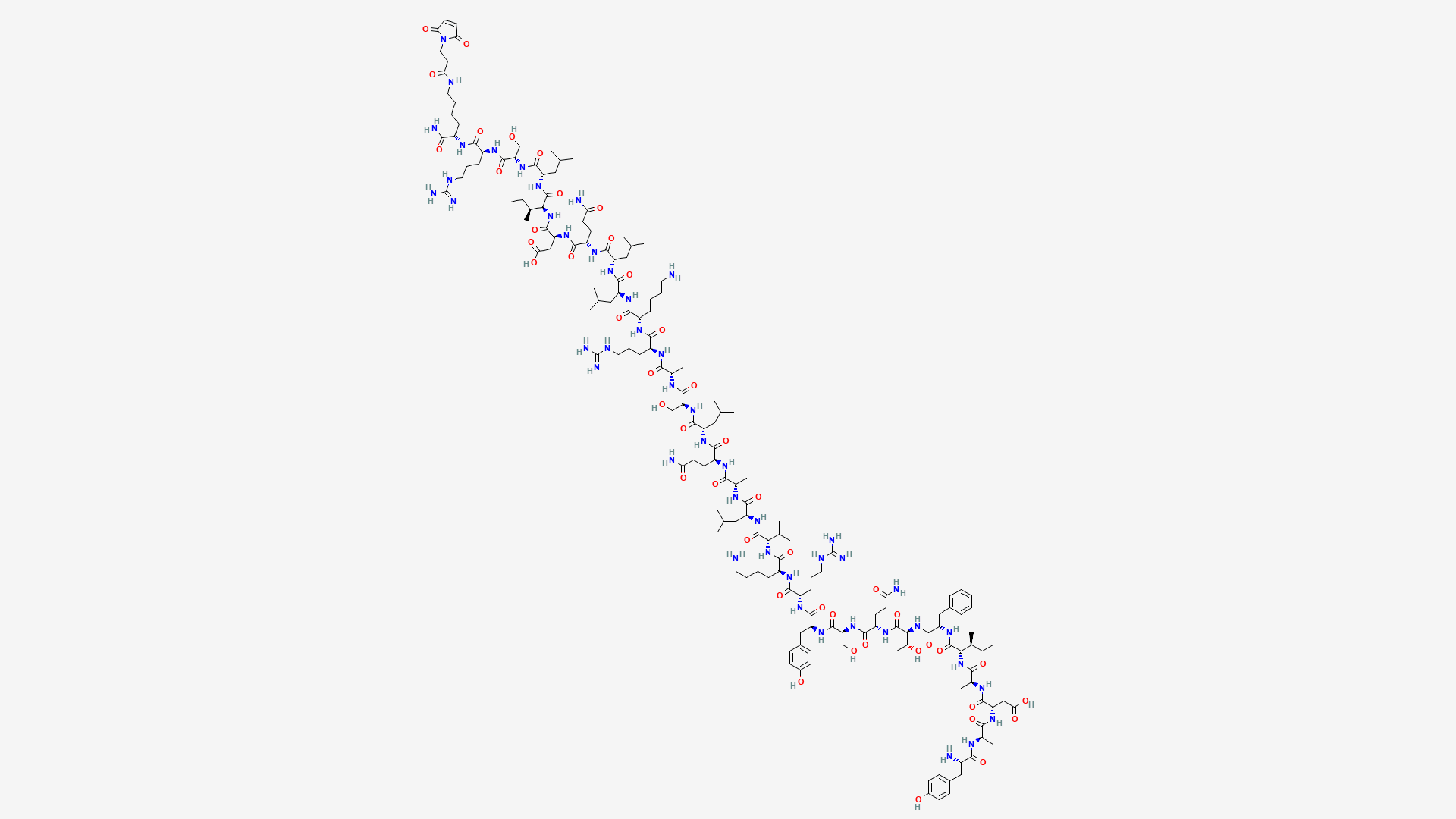CJC-1295 is a synthetic analogue of GHRH and growth hormone secretagogue (GHS) that has research applications in the fields of growth hormone deficiency, sleep quality, and anti-aging. Inside, researchers will find what they must know about CJC-1295, including results from clinical trials.

CJC-1295 is a synthetic analogue of growth hormone-releasing hormone (GHRH) and a growth hormone secretagogue (GHS) that was developed in the mid-2000s by ConjuChem Technologies [1]. Originally designed to treat obesity issues in HIV/AIDS patients, the peptide has since been shown to effectively treat growth hormone deficiency, improve sleep quality, and promote longevity, and is classified as a prohibited substance under Section S2 of the World Anti-Doping Agency’s (WADA) Prohibited List [2, 3].
While standard CJC-1295 peptide is made up of 29 amino acids [4], it is most commonly available as CJC-1295 DAC, which stands for “Drug Affinity Complex.” DAC is a bioconjugation platform that improves the ability of the CJC-1295 peptide to bond with blood protein, giving it a much longer half-life than regular CJC-1295 [5].
Confusion has arisen because the original CJC-1295 from ConjuChem Technologies contained DAC, yet other manufacturers subsequently began producing CJC-1295 without DAC. To clear up this confusion, CJC-1295 that does not contain DAC is typically labeled as “CJC-1295 Without DAC” or “CJC-1295 No DAC” [6].
All references to CJC-1295 herein are references to CJC-1295 with the added DAC technology developed by ConjuChem.
At the time of writing, there are no FDA-approved products containing CJC-1295, and the peptide is classed as an Investigational New Drug in the United States, available exclusively to researchers as a reference material.

While we have limited human data on CJC-1295, we can nonetheless draw on small-scale studies and animal research to summarize the key CJC-1295 benefits observed to date:
CJC-1295 may promote deep sleep: Several studies have suggested that GHRH plays a direct role in improving the quality of sleep. As CJC-1295 is a synthetic analogue of GHRH, there is strong research interest in the role it may play in sleep.
Fehm et al. investigated intranasal administration of GHRH and documented the effect it had on sleep quality. The study was performed according to a double-blind cross-over design and involved 12 young and 11 old healthy male test subjects, each of whom were intranasally administered 300 micrograms GHRH or placebo 30 min before bedtime [8].
Sleep was recorded polysomnographically until 7 am and blood was collected in 15 minute intervals for determination of cortisol and GH. Apart from the well-known age-related changes in hormonal secretion and sleep, intranasal GHRH had the following effects:
Based on these findings, intranasal GHRH appears to help regulate sleep processes and hypothalamic-hypophysiotropic secretory activity in both young and elderly male test subjects. This suggests that GHRH mimics the dual neuronal and endocrine function of hypothalamic GHRH activity.
Sleep helps recovery from muscle injury [9]. GH has been shown to enhance non-REM sleep after a period of sleep deprivation [10]. As a GHRH analogue, CJC-1295 is being actively investigated for its potential to produce deep, restorative sleep in subjects.
CJC-1295 may increase muscle mass: CJC-1295’s documented ability to increase levels of GH and IGF-1 has prompted research interest in the role that it may play in increasing muscle mass. CJC-1295 stimulates protein synthesis and supports muscle mass growth. While research in this area is ongoing, it remains to be determined whether healthy subjects may receive anabolic benefit from increased GH and IGF-1 [11].
Researchers interested in exploring CJC-1295’s purported effect on muscle mass may consider a blend of CJC-1295 and ipamorelin. This peptide combination has been linked to increased protein synthesis and muscle mass growth.
CJC-1295 may stimulate fat loss: Studies have shown that prolactin promotes visceral fat accrual in various animal models [12] and that CJC-1295 can normalize prolactin levels as shown in GHRH knockout mice [13], which can lead to increased fat metabolization. These findings have led to strong research interest in the role that CJC-1295 may play in fat loss through prolactin regulation.
Researchers interested in exploring CJC-1295’s purported ability to stimulate fat loss may consider a blend of CJC-1295 and GHRP-2. GHRP-2 also stimulates GH release from the anterior pituitary by acting on a different receptor to CJC-1295, called the growth hormone secretagogue receptor (GHSR). Studies in animal models have shown that GHRP-2 has a positive effect on muscle mass, heart function, and the immune system, suggesting that it may work synergistically when administered with CJC-1295.
In the early days of CJC-1295’s development, ConjuChem tested CJC-1295 as a potential treatment for HIV-associated lipodystrophy. One of the patients in the study died, though the attending physician concluded that the cause was not due to CJC-1295 administration [14].
The most common self-reported side effects of CJC-1295 are [15]:
While several short-term studies involving CJC-1295 indicate that this peptide has a positive safety profile, long-term studies are lacking and further research is needed to confirm its safety.
A key safety concern among researchers is that CJC-1295 has an extremely long half-life of 6-10 days. This means that it does not have a natural model of action and may potentially cause unwanted side effects during long-term administration.
Clearly, a well-designed phase 1 safety study with independent validation would be required before drawing any conclusions.
Concerning CJC-1295 dosage, researchers may refer to the two 2006 studies by Teichman et al., which involved healthy test subjects aged 21-61 and followed a randomized, placebo-controlled, double-blind, ascending dose design [16].
After measuring the peak concentrations and area under the curve of GH and IGF-1, researchers found that CJC-1295 increased mean plasma GH concentrations by 2- to 10-fold for 6 days or more, and increased mean plasma IGF-I concentrations by 1.5- to 3-fold for 9-11 days.
Studies suggest that CJC-1295 boosts GH and IGF-I levels in healthy adults and is tolerated in a dose range of 30-60 μg/kg [17]
Learn more about CJC-1295 dosing here.
Researchers interested in where to buy CJC-1295 online will be pleased to know that our team has done the legwork and tested a handful of peptides vendors known for their product quality, transparency, and efficiency.
Here are the top-rated vendors:
When looking for CJC-1295 No DAC, our top recommendation for researchers is:
Research Peptide is our preferred research peptide vendor at Peptideinfo.net.
We like Research Peptide because of their outstanding quality control measures, their extremely responsive customer service team, their BBB-accreditation, and their quick domestic and international shipping options for customers.
Here’s a little bit more information about why we prefer Research Peptide to other vendors:
Additionally, peptide researchers are eligible for a 10% discount on their next Research Peptide order using our exclusive discount code. Click the banner below and then add this code:
If a researchers is looking to purchase CJC-1295, we like this impressive peptides vendor:
Here’s what we like about this company:
When a CJC-1295 No DAC + Ipamorelin blend is required for the study, we recommend researchers look here:
Top peptide researchers know that a lab is not complete without the right set of ancillary tools for the correct preparation, storage, and handling of peptides, including CJC-1295.
What does this list of supplies include? Items like bacteriostatic water, sterile vials, and alcohol wipes are indispensable.
Usually, a research lab may need supplies and materials like:
For researchers who do not have the materials listed above, it is recommended to check authorized vendors.
CJC-1295 is available in the form of powder and must be reconstituted using bacteriostatic or sterile water.
After being reconstituted, CJC-1295 is administered subcutaneously.
CJC-1295 is reconstituted with bacteriostatic water.
Qualified researchers may legally purchase CJC-1295 as a reference material for in vitro experimentation. At this time, CJC-1295 is not sold to the general public or intended for human use.
Short-term studies involving CJC-1295 have reported this peptide to be safe and relatively well tolerated by test subjects. No serious adverse events have been documented.
CJC-1295 has been shown to increase GH and IGF-1 levels in test subjects and is of interest to researchers interested in its effects on body composition, anti-aging, and sleep, among other applications.
No, CJC-1295 is not an anabolic-androgenic steroid. It is a synthetic analogue of GHRH and growth hormone secretagogue (GHS).
No, CJC-1295 increases serum levels of GH and IGF-I, but does not increase testosterone.
Administration of CJC-1295 is associated with sustained, dose-dependent increases in GH and IGF-I levels in healthy subjects, by consequence of which CJC-1295 may have a role in increasing muscle mass.
No, there is no evidence that CJC-1295 administration directly causes weight gain. On the other hand, research indicates that CJC-1295 may stimulate fat loss through prolactin regulation.
CJC-1295 has demonstrated potential as a growth hormone-releasing hormone analogue that stimulates both GH and IGF-1 for a prolonged period of six to ten days, thanks to the addition of ConjuChem’s DAC technology.
As higher levels of both GH and IGF-1 have been linked to performance-enhancing effects such as increased muscle mass, better sleep, and decreased fat, CJC-1295 remains firmly on the radar of peptide researchers.
Researchers wishing to explore the benefits and side effects of CJC-1295 further are advised to visit our preferred vendor.

Disclaimer: Peptideinfo.net contains information about products that are intended for laboratory and research use only, unless otherwise explicitly stated. This information, including any referenced scientific or clinical research, is made available for educational purposes only. Peptideinfo.net makes every effort to ensure that any information it shares complies with national and international standards for clinical trial information and is committed to the timely disclosure of the design and results of all interventional clinical studies for innovative treatments publicly available or that may be made available. However, research is not considered conclusive. Peptideinfo.net makes no claims that any products referenced can cure, treat or prevent any conditions, including any conditions referenced on its website or in print materials.
To the extent that Peptideinfo.net references a product that is also a prescription medication, Peptideinfo.net does not does not offer medical diagnosis or treatment advice. The contents of Peptideinfo.net are intended exclusively for qualified researchers. Any individual seeking any advice on any prescription medication, or any disease or condition, is advised to refrain from using this site and consult their healthcare provider. Statements regarding products presented on Peptideinfo.net are the opinions of the individuals making them and are not necessarily the same as those of Peptideinfo.net.
Your access to Peptideinfo.net is subject to our terms of use.